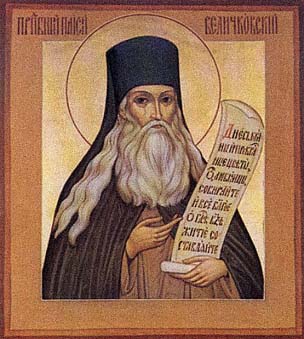
St. Paisius (Velichkovsky) of Moldavia and Mt. Athos (1794)
Commemorated on November 15
He was born in Ukraine in 1722, one of the many children of a
priest. He attended the Ecclesiastical Academy in Kiev, but was disappointed by
the worldliness, love of ease and western theological climate that he found
there.
After four years he left the school and embarked on a search for a spiritual
father and a monastery where he could live in poverty. He eventually found wise
spiritual guides in Romania, where many of the Russian monks had fled after
Peter the Great's reforms. From there he traveled to the Holy Mountain.
Spiritual life was at a low ebb there also, and Plato (the name he had been
given as a novice) became a hermit, devoting his days to prayer and reading the
Holy Scriptures and the writings of the Fathers. After four years, a visiting
Elder from Romania tonsured him a monk under the name Paisius, and advised him
to live with other monks to avoid the spiritual dangers of taking up the
solitary life too soon. A few brethren from Romania arrived, seeking to make him
their spiritual father, but as he felt unworthy to take on this task, all of
them lived in poverty and mutual obedience. Others joined them from Romania and
the Slavic countries, and in time they took up the cenobitic life, with Paisius
as their reluctant abbot.
In 1763 the entire community (grown to sixty-five in number) left the Holy
Mountain and returned to Romania. They were given a monastery where they adopted
the Athonite rule of life. Abbot Paisius introduced the Jesus Prayer and other
aspects of hesychasm to the monastic life there: before this time, they had been
used mostly by hermits. The services of the Church were conducted fully, with
the choirs chanting alternately in Slavonic and Romanian. The monks confessed to
their Elder every evening so as not to let the sun go down on their anger, and a
brother who held a grudge against another was forbidden to enter the church, or
even to say the Lord's Prayer, until he had settled it.

The monastic brotherhood eventually grew to more than a thousand, divided into
two monasteries. Visitors and pilgrims came from Russia, Greece and other lands
to experience its holy example.
St Paisius had learned Greek while on Mt Athos, and undertook to produce
accurate Slavonic translations of the writings of many of the Fathers of the
Church. The Greek Philokalia had been published
not long before, and St Paisius produced a Slavonic version that was read
throughout the Slavic Orthodox world. (This is the Philokalia
that the pilgrim carries with him in The Way of a Pilgrim).
The Saint reposed in peace in 1794, one year after the publication of his
Slavonic Philokalia. The Synaxarion summarizes
his influence: "These translations, and the influence of the Saint through the
activity of his disciples in Russia, led to a widespread spiritual renewal, and
to the restoration of traditional monastic life there which lasted until the
Revolution of 1917."